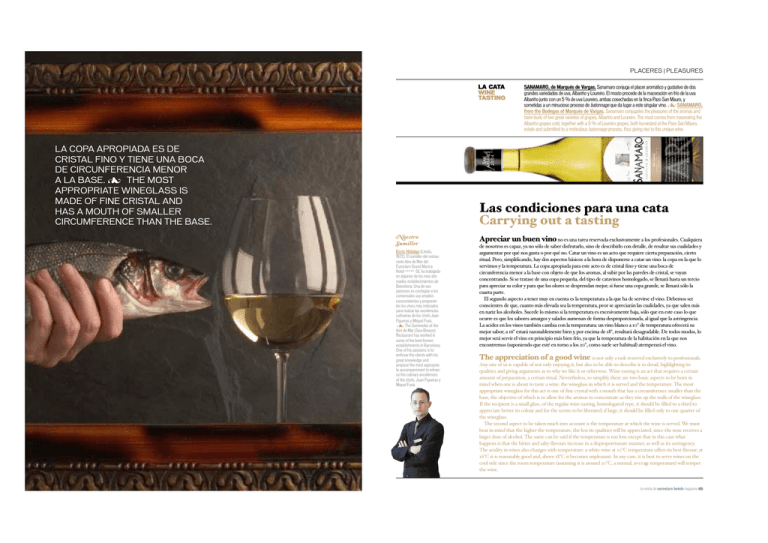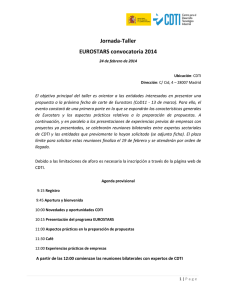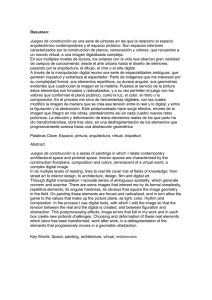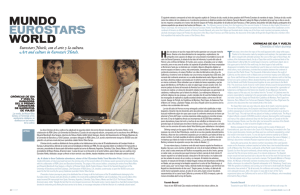Carrying out a tasting Las condiciones para una cata
Anuncio

PLACERES | PLEASURES LA CATA WINE TASTING LA COPA APROPIADA ES DE CRISTAL FINO Y TIENE UNA BOCA DE CIRCUNFERENCIA MENOR A LA BASE. 3 THE MOST APPROPRIATE WINEGLASS IS MADE OF FINE CRISTAL AND HAS A MOUTH OF SMALLER CIRCUMFERENCE THAN THE BASE. SANAMARO, de Marqués de Vargas. Sanamaro conjuga el placer aromático y gustativo de dos grandes variedades de uva, Albariño y Loureiro. El mosto procede de la maceración en frío de la uva Albariño junto con un 5 % de uva Loureiro, ambas cosechadas en la finca Pazo San Mauro, y sometidas a un minucioso proceso de batonnage que da lugar a este singular vino. 3 SANAMARO, from the Bodegas of Marqués de Vargas. Sanamaro conjugates the pleasures of the aromas and taste-buds of two great varieties of grapes, Albariño and Loureiro. The must comes from macerating the Albariño grapes cold, together with a 5 % of Loureiro grapes, both ha rvested at the Pazo San Mauro, estate and submitted to a meticulous batonnage process, thus giving rise to this unique wine. Las condiciones para una cata Carrying out a tasting Nuestro Sumiller Enric Hidalgo (Lleida, 1972). El sumiller del restaurante Aire de Mar del Eurostars Grand Marina Hotel ★★★★★ GL ha trabajado en algunos de los más afamados establecimientos de Barcelona. Una de sus pasiones es contagiar a los comensales sus amplios conocimientos y proponerles los vinos más indicados para realzar las excelencias culinarias de los chefs Juan Figueras y Miquel Fuxá. 3 The Sommelier of the Aire de Mar (Sea-Breeze) Restaurant has worked in some of the best-known establishments in Barcelona. One of his passions is to enthuse the clients with his great knowledge and propose the most appropriate accompaniment to enhance the culinary excellences of the chefs, Juan Figueras y Miquel Fuxá. Apreciar un buen vino no es una tarea reservada exclusivamente a los profesionales. Cualquiera de nosotros es capaz, ya no sólo de saber disfrutarlo, sino de describirlo con detalle, de resaltar sus cualidades y argumentar por qué nos gusta o por qué no. Catar un vino es un acto que requiere cierta preparación, cierto ritual. Pero, simplificando, hay dos aspectos básicos a la hora de disponerse a catar un vino: la copa en la que lo servimos y la temperatura. La copa apropiada para este acto es de cristal fino y tiene una boca de circunferencia menor a la base con objeto de que los aromas, al subir por las paredes de cristal, se vayan concentrando. Si se tratase de una copa pequeña, del tipo de catavinos homologado, se llenará hasta un tercio para apreciar su color y para que los olores se desprendan mejor; si fuese una copa grande, se llenará sólo la cuarta parte. El segundo aspecto a tener muy en cuenta es la temperatura a la que ha de servirse el vino. Debemos ser conscientes de que, cuanto más elevada sea la temperatura, peor se apreciarán las cualidades, ya que salen más en nariz los alcoholes. Sucede lo mismo si la temperatura es excesivamente baja, sólo que en este caso lo que ocurre es que los sabores amargos y salados aumenan de forma desproporcionada, al igual que la astringencia. La acidez en los vinos también cambia con la temperatura: un vino blanco a 10º de temperatura ofrecerá su mejor sabor; a 16º estará razonablemente bien y, por encima de 18º, resultará desagradable. De todos modos, lo mejor será servir el vino en principio más bien frío, ya que la temperatura de la habitación en la que nos encontremos (suponiendo que esté en torno a los 20º, como suele ser habitual) atemperará el vino. The appreciation of a good wine is not only a task reserved exclusively to professionals. Any one of us is capable of not only enjoying it, but also to be able to describe it in detail, highlighting its qualities and giving arguments as to why we like it or otherwise. Wine-tasting is an act that requires a certain amount of preparation, a certain ritual. Nevertheless, to simplify, there are two basic aspects to be born in mind when one is about to taste a wine: the wineglass in which it is served and the temperature. The most appropriate wineglass for this act is one of fine crystal with a mouth that has a circumference smaller than the base, the objective of which is to allow for the aromas to concentrate as they rise up the walls of the wineglass. If the recipient is a small glass, of the regular wine-tasting, homologated type, it should be filled to a third to appreciate better its colour and for the scents to be liberated; if large, it should be filled only to one quarter of the wineglass. The second aspect to be taken much into account is the temperature at which the wine is served. We must bear in mind that the higher the temperature, the less its qualities will be appreciated, since the nose receives a larger dose of alcohol. The same can be said if the temperature is too low, except that in this case what happens is that the bitter and salty flavours increase in a disproportionate manner, as well as its astringency. The acidity in wines also changes with temperature: a white wine at 10ºC temperature offers its best flavour; at 16ºC it is reasonably good and, above 18ºC it becomes unpleasant. In any case, it is best to serve wines on the cool side since the room temperature (assuming it is around 20ºC, a normal, av e r age temperature) will temper the wine. la revista de eurostars hotels magazine 65 PLACERES | PLEASURES PROPUESTAS PROPOSITIONS A PESAR DE SU VOCACIÓN TRADICIONAL, LA COCINA GALLEGA ESTÁ EN CONSTANTE EVOLUCIÓN. 3 DESPITE ITS TRADITIONAL VENEER, GALICIAN CUISINE IS IN CONSTANT EVOLUTION. Entre las propuestas que se pueden degustar en el Monasterio de San Clodio destacan la Barca con variado de mariscos de la ría, la Carrillera ‘8 horas’ de ternera con puré de zanahoria y patata graten; las Vieiras con compota de cebolla y cebollino, reducción balsámica y aceite de perejil; el Lomo de bacalao confitado al ajo con espuma de patata, aceite de ñora y chips de hortalizas o el Chocolate en sus 3 texturas. 3 Amongst the propositions that can be savoured in the San Clodio Monastery, worthy of mention are the Boat with varied seafood from the Ría; the ‘8-hours’ veal-cheek dish with puréed carrots and potatoes au gratin; the Scallops with compote of onions and chives, balsamic reduction and parsley oil, or the Chocolate in its 3 textures. Cocina gallega: explosión de sabores Galicia Cuisine: an explosion of flavours Nuestro Chef Julio Sotomayor. A sus 24 años ha recorrido una amplia diversidad de restaurantes del territorio gallego. En su currículum figuran el Balneario Vila Termal de Laias, el Restaurante Galileo, el Restaurante San Miguel o los dos establecimientos de Eurostars Hotels en Ourense: el Eurostars Auriense y el Hotel Monumento Monasterio de San Clodio. 3 Julio Sotomayor. He has made his way through a wide selection of restaurants in Galicia, despite his youth (24). In his CV figure the Laias Thermal Spa, the Galileo Restaurant, the San Miguel Restaurant or two of the Eurostars Hotels establishments in Ourense: the Eurostars Auriense and the Hotel Monumento Monasterio de San Clodio. Hablar de cocina gallega es iniciar un viaje gastronómico por productos de suprema calidad, sean fruto del mar o de las prolíficas tierras del interior. Y es que Galicia cuenta con unas privilegiadas rías y una de las huertas más fértiles de la Península Ibérica, algo que la dota de una amplia y rica variedad de alimentos que nos hace el trabajo muy fácil a los cocineros. Sin duda, los platos más populares son los de mariscos, que incluyen el pulpo, los vívalos, las vieiras o las navajas. Pero no hay que dejar a un lado las carnes, entre las que sobresale la ternera gallega, aunque también todas aquellas que provienen del cerdo, ya que la matanza del este animal es toda una tradición en los hogares del campo de Galicia. También es necesario recordar la bondad de nuestros quesos frescos, la exquisita elaboración de la repostería y las filloas, que constituyen el más original y agradable postre que se puede saborear en nuestra tierra. También destaca la tarta de Santiago, cuyo principal ingrediente es la almendra, pero siempre con una copita del aguardiente del país, con el que se prepara la mágica y digestiva queimada. Todos estos productos, que gozan de la más alta calidad y que preparamos con el mayor esmero y profesionalidad, se pueden acompañar de los exquisitos vinos de las denominaciones de origen gallegas: Monterrey, Rías Baixas, Ribeira Sacra, Ribeiro o Valdeorras. La gallega, es pues, una cocina que, a pesar de resultar tradicional, va evolucionando y renovándose día a día, consiguiendo una explosión de sabores puros a través de originales combinaciones. To talk about the cuisine from Galicia is tantamount to the beginning of a gastronomic tour through products of supreme high quality, be they fruits of the sea or of the prolific hinterland. Because Galicia has privileged fjord-like estuaries and one of the most fertile horticultural lands in the Iberian Peninsula, all of which bestow the region with a wide and rich variety of food, making work very easy for the chefs. Without any doubt, the most popular dishes are those composed of seafood, which include octopus, bivalves, scallops or razor shells. But one cannot ignore the meats, amongst which stand out the veal from Galicia and all that is made from pork, since the sacrificing of this animal is a great tradition in our homes. One must also remember the goodness of our fresh cheeses, the exquisite confectionery that is produced and the filloas, the most original and pleasant dessert that can be savoured in our homeland. Also noteworthy is the Santiago cake, the main ingredient of which is almonds; but always to be sampled with a glass of locally distilled liqueur, with which the magical and digestive queimada is prepared. All these products, that are of the highest quality and that we painstakingly prepare with the greatest of professional pride, can be accompanied by the exquisite wines with denominations of origin from Galicia: Monterrey, Rías Baixas, Ribeira Sacra, Ribeiro o Valdeorras. Galician cuisine is, therefore, a cuisine that despite its traditional veneer, is in constant evolution, renewing itself day by day, achieving an explosion of pure flavours by means of original combinations. la revista de eurostars hotels magazine 67 PLACERES | PLEASURES Propuestas suculentas Succulent propositions El restaurante Aire de Mar del Eurostars Grand Marina Hotel H H H H H GL (Barcelona) organiza varias jornadas gastronómicas a disposición de sus clientes. Puede ampliar información o realizar su reserva para cualquiera de estas jornadas en el teléfono 93 603 90 10 o en el e-mail: [email protected] The Aire de Mar (Sea Breeze) restaurant in Eurostars Grand Marina Hotel H H H H H GL organizes several workshops for benefit of our clients. For more information or to make your reservation for any of these workshops, please call 93 603 90 10 or contact via e-mail at [email protected] LA CUCHARA DEL AIRE DE MAR NOCHES DE CAVA NOCHES ROMÁNTICAS El placer de degustar la cocina de toda la vida Una velada repleta de burbujas El amor está en el aire... de mar Lentejas, fabadas, calderetas.... La cocina de cuchara, tradicionalmente ligada a la vida cotidiana de los pueblos, constituye el origen de la dieta mediterránea y goza de sanas propiedades, gracias a la sabia combinación de legumbres y verduras con carnes y pescados. El equipo de cocina del Eurostars Grand Marina HotelH H H H HGL rinde homenaje a estos platos adaptándolos a las nuevas tendencias gastronómicas del siglo XXI con las jornadas “La cuchara del Aire de Mar”. Esta original propuesta culinaria, que se podrá degustar hasta el 16 de noviembre, se compone de Alubias blancas de la Alberca con Almejas gallegas de la Ría, Lentejas Pardinas estofadas con foie de pato asado y cebollino, Garbanzos de Pedrosillano con espinacas y bacalao, Caldereta de Cordero con patatas y pimientos verdes, y Caldereta de Bogavante del Cantábrico. Una explosión de sabores que deleitarán a los paladares más exigentes. De domingo a jueves, las “Noches de Cava”, del Eurostars Grand Marina Hotel H H H H HGL proponen originales maridajes que demuestran que las excelencias de estos espumosos van mucho más allá del acompañamiento de postres o aperitivos El MaîtreSommelier del hotel, Enric Hidalgo, ha elaborado una cuidada selección de Cavas de diferentes bodegas y variedades para realzar los contrastes con los diferentes platos elaborados por Sánchez y los cocineros del “Aire de Mar” dirigidos por Juan Figueras. La colección de cavas recomendados incluye el Agustí Torello Brut Nature, un reserva de la familia Juvé Camps, el Rovellats Imperial, el Gran reserva Kripta y el Brut Nature de Recaredo. Estos caldos completan delicias como la Coca de Pan Crujiente, puré de cebolla tierna, cigalas y jamón ibérico; el Rubio de Playa asado con sofrito de acelgas, panceta y alcachofas; las Carrilleras de ternera con patatas rotas, tomate confitado y su jugo de cocción o el gran colofón final, el Savarin de chocolate, cítricos y crema catalana. El restaurante del Eurostars Grand Marina Hotel H H H H HGL diseña las “Noches Románticas”, con todos los ingredientes para una velada inolvidable.El romanticismo invade las instalaciones del restaurante “Aire de Mar” las noches de los viernes y los sábados. Las Noches Románticas son auténticas veladas en las que la comida, la bebida y el ambiente se conjugan para lograr que el amor sea el gran protagonista. La elaboración del menú es un auténtico in crescendo de pasión. Desde la Ensalada de bogavante con lentejas beluga y vinagreta de mostaza antigua, pasando por la Coca crujiente de pimientos escalibados al comino, foie y jamón ibérico, la Lluerna de playa rellena de acelgas y albardado con tocino ibérico y el Cochinillo confitado con sal de cítricos, verduras salteadas y salsa de naranja. La experiencia alcanza su cúspide con el dulce y delicado sabor de la Copita de chocolate blanco y fruta de la pasión y se remata con el contraste del Savarín de chocolate, con crema catalana y limón. Cava: An evening full of bubbles. From Sunday to The pleasure of sampling those traditional dishes. Lentils, bean stews, lamb and fish stews… The spoon cuisine, traditionally bound to everyday village life, constitutes the origin of the Mediterranean diet and is bestowed with healthy properties, thanks to the wise combination of pulses and vegetables with meat and fish. The kitchen staff of the Eurostars Grand Marina HotelH H H H HGL wishes to render tribute to these dishes, adapting them to the new gastronomic trends of the 21st century, under the title “The Aire de Mar Spoonful”. This original proposal that can be sampled until 16 November, is composed of the following dishes:White Beans from Alberca with Clams from the Galician Estuaries, Pardinas Lentils stewed with Roast Duck Foie and Chives, Chickpeas from Pedrosillano with Spinach and Salted Cod, Lamb Hotpot with Potatoes and Green Capsicum Peppers and Lobster Hotpot from the Cantabrian Coast. An explosion of flavours that will delight the most demanding of palates. 68 ESTAR Thursday, the “Cava Nights” held at the Eurostars Grand Marina HotelH H H H HGL propose original partnerships to demonstrate that the excellences of these sparkling wines go much further than that of simple accompaniment for desserts or aperitifs. The Hotel’s Maître-Sommelier, Enric Hidalgo, has carried out a careful selection of Cavas from different bodegas and varieties with a view to enhancing the contrasts of the different dishes elaborated by Sánchez and the “Aire de Mar” cooks, supervised by Juan Figueras. Recommended cavas include the Agustí Torello Brut Nature, a reserve wine from the Juve Camps family; the Rovellats Imperial, the Gran Reserva Kripta and the Brut Nature from Recaredo. These wines complement delicacies like the Crunchy Bread Coca, tender onion purée, crayfish and Iberian jam; the baked rock Lluerna with a sauté of chard, salted streaky bacon and artichokes; the veal ribs with broken potatoes and tomato confit in its own juice or the final great fanfare, the Savarin: chocolate, citrus fruit and Catalan cream. Romantic evenings: love is in the sea... air. The Eurostars Grand Marina HotelH H H H HGL Restaurant has designed its “Romantic Evenings” with all the ingredients necessary for an unforgettable evening. Romanticism invades all corners of the “Aire de Mar” on Fridays and Saturdays. The Romantic Evenings are magical, with the food, drink and atmosphere aligned in conjunction to focus the spotlight on love. The menu card is a genuine ‘in crescendo’ of passion. From the Lobster salad with Beluga lentils and mustard vinaigrette, through the crunchy roasted pepper and cumin Coca with foie and Iberian ham, the rock Lluerna fish stuffed with chard and tied with salty bacon strips and the Suckling piglet in caramelised citrus salt, sautéed vegetables and orange sauce. The experience reaches its climax with the sweet yet delicate flavour of its Goblet of white chocolate and passion fruit, to finish with the contrast of the chocolate, Catalan cream and lemon Savarin. la revista de eurostars hotels magazine 69



